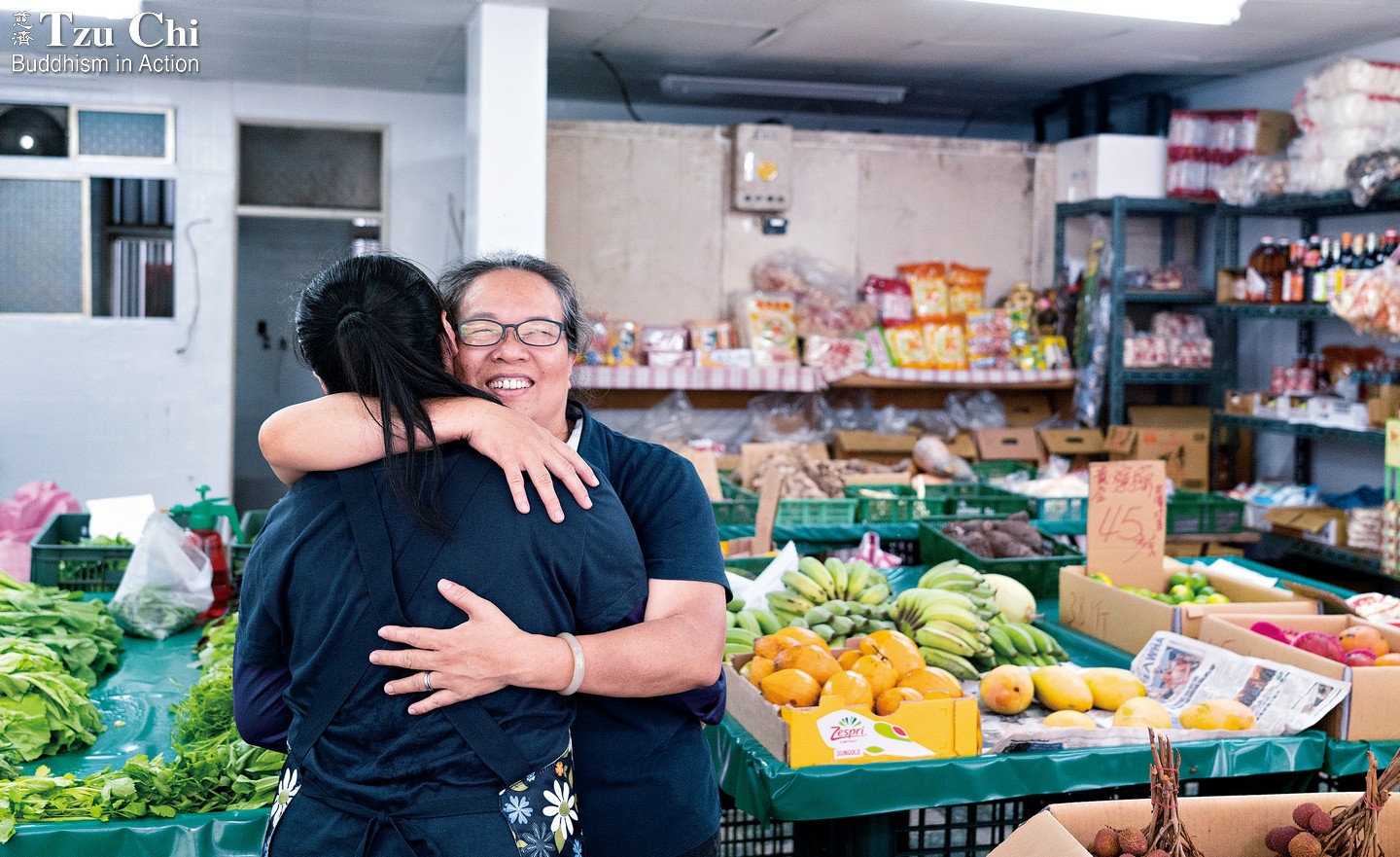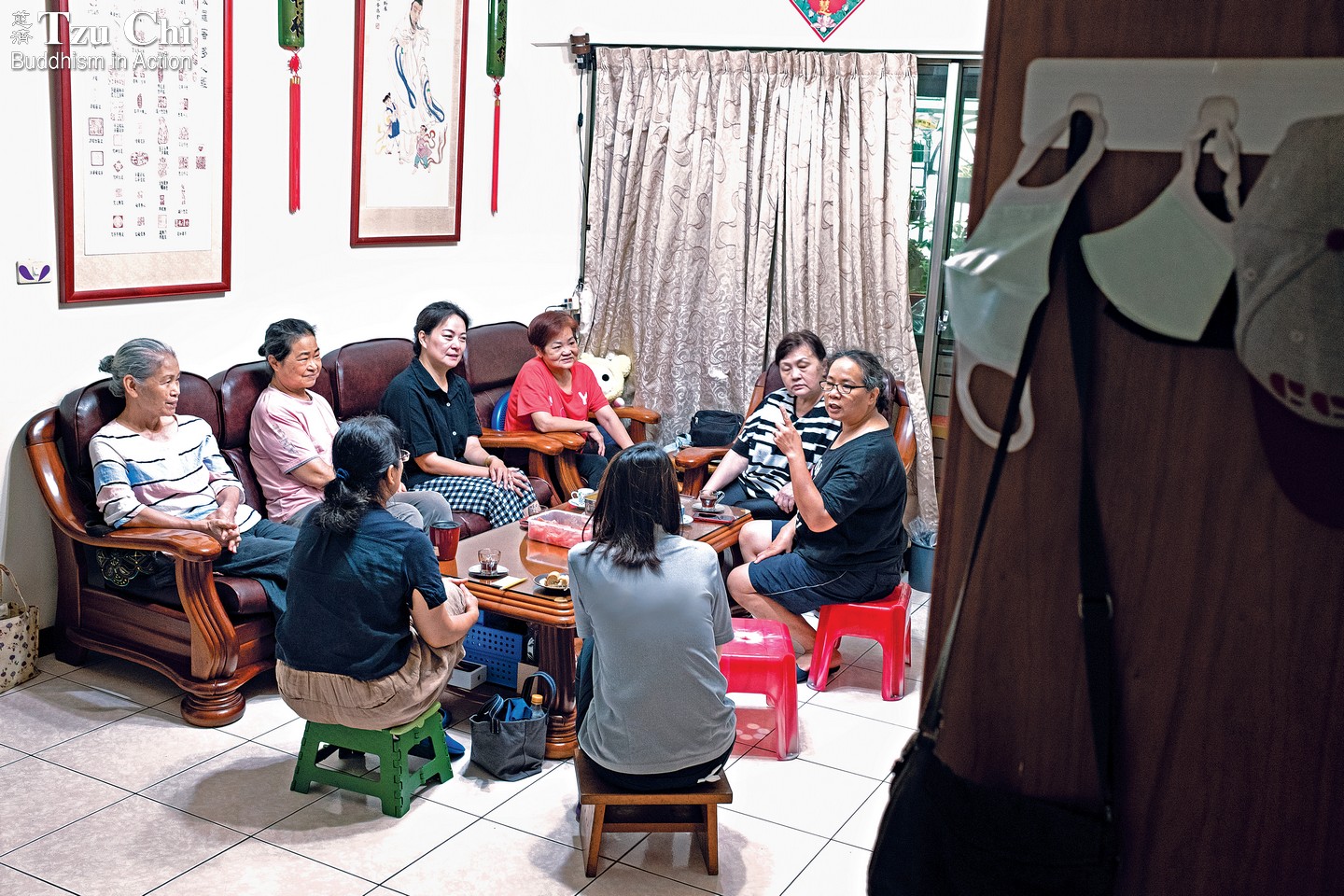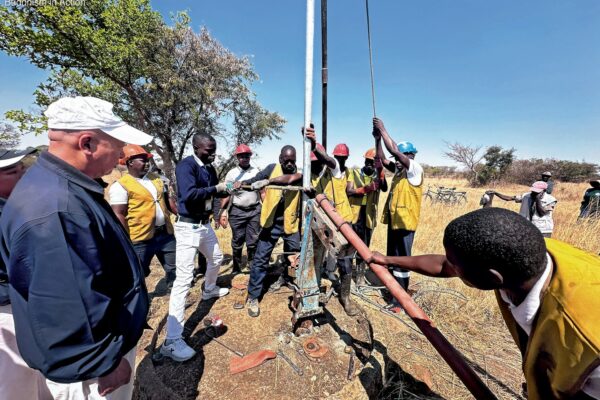By Chen Li-an
Translated by Wu Hsiao-ting
Photos by Hsiao Yiu-hwa
Tzu Chi volunteers in Taiwan phoned more than 50,000 underprivileged families on the island during the pandemic to extend care and aid to them.

Volunteer Lin Chun-jin (right) hugs a single mother while visiting her at the greengrocer’s shop where she works. Tzu Chi launched a care program in Taiwan in mid-April for families whose financial health has been affected by the pandemic.
It has been some time since the coronavirus situation in Taiwan has slowed down. Some families fared well during the pandemic, but not all were so lucky. The unlucky ones have seen their jobs impacted and incomes decrease sharply.
Yan, a resident of New Taipei City, northern Taiwan, quit her job in December 2019 because long-term stress from work had caused her health to suffer. Her son had just been discharged from his compulsory military service at that time, and he had started working at a company whose business was to organize all sorts of events. It seemed like a good time for her to quit her job.
But when the coronavirus started spreading beyond China earlier this year, the social distancing measures enforced by the Taiwanese government caused the company’s business to drop sharply. Yan’s son received only half his pay in late February and none in March. With no other choice, Yan began working as a hospital porter in May to help with her family’s finances. The job brought in some extra money, but the pay was minimal and still not enough to cover her family’s rent, utility bills, and other living expenses. She borrowed 15,000 Taiwanese dollars (US$510) from a relative to tide her over, but she knew that the loan and what little savings she had left wouldn’t last long. The anxiety about her finances just kept growing. It was then that she received a phone call from Tzu Chi volunteer Lin Chun-jin (林春金). Yan used to be a Tzu Chi care recipient. The phone call led Tzu Chi to add Yan to the foundation’s aid list again.
Lin recalled that phone call with Yan: “When I called Yan, she said to me, ‘This phone call feels like I’ve been given a piece of wood to cling to as I struggle to stay afloat on a boundless sea.’ Her statement made me so happy I had called, since I had the opportunity to help a family that was badly in need of help.”
To cushion the economic impact of the COVID-19 outbreak, the Taiwanese government implemented several relief measures to bail out companies, families, and individuals. For example, disadvantaged children, low-income families, and the physically and mentally challenged were given 1,500 Taiwanese dollars (US$50) a month from April to June to subsidize their living expenses. These measures helped many people, but not all. Some needy families failed to meet the criteria for government aid for one reason or another, but they needed help just as much. What were they to do?
To help folks who had slipped through the social security net, Tzu Chi volunteers and employees, in response to Dharma Master Cheng Yen’s instructions, launched a care program in mid-April for families whose finances had been negatively affected by the pandemic. Volunteers and social workers called the families currently receiving Tzu Chi aid to find out if they needed any assistance during this critical time. They also called families that the foundation had ceased providing aid to in the previous couple of years because their financial situations had improved. There were more than 50,000 such households to contact.
The households were organized and divided into groups by where they lived. As soon as volunteer Lin Chun-jin received her care list, she invited volunteers Xu Shu-yun (許淑雲) and Li Yu-hua (李玉華) to her home to help phone the more than 50 families on her roster.
Phone calls of caring
“Thanks to Master Cheng Yen and Tzu Chi for remembering me!” said Trần, a single mother originally from Vietnam. She divorced her husband because he did drugs and was abusive, and now lives alone with their daughter. She was the first person volunteer Lin called. Lin had cared for her before.
Trần told Lin on the phone that due to the impact of the coronavirus, she had had to close her food stall in the market. Fortunately, she had gotten a job at a greengrocer’s shop, so she had been able to get by. Lin worried that she might not be telling the whole truth because she was too shy to ask for help, so she decided to check on her at the shop where she worked. She paid a visit to the shop a few days later, and was relieved to see that Trần seemed to be doing well at her job. “She gave me a tight hug when she saw me,” Lin recalled of the meeting. “She made me feel that Tzu Chi was an important support to her in her heart.” Of all the people Lin had called, Trần was among those who had done better, having come through a difficult time without a deep impact.
Lin and the two volunteers who assisted her weren’t familiar with the situations of all the families on their list, so the first step in reaching out was to check and review the records of a family. Only when they had some understanding of a family’s background and had discussed among themselves how to go about extending care to the family did they make the phone calls. “For example, if we learned that some family had once been plunged into financial distress because the breadwinner had problems keeping a job,” Lin explained, “we’d inquire whether their job situation had improved.”
Lin knew how much Master Cheng Yen was concerned about how the needy were doing during the pandemic, so she cheerfully tackled the task of calling the households. When she couldn’t reach a family during the day, she’d try again at night. No matter the effort, she didn’t want to miss any family that might need help.
Taiwan has done remarkably well during the coronavirus pandemic, but its economy has sustained damage all the same, especially in the tourism, transportation, and dining sectors. Some underprivileged families, as a result, have taken a hard hit. An example is Yan, mentioned at the beginning of this article. She had done well enough before the pandemic for Tzu Chi to cease their aid to her, but the pandemic turned the tables on her. In the time of COVID-19, she found herself needing help again.
According to statistics from Taiwan’s Ministry of Labor, nearly 30,000 employees had been put on unpaid leave as of mid-June—higher than any time in the past decade. There had been 56 cases of massive layoffs by the end of April. Though by mid-June Taiwan had not recorded a single domestic coronavirus case in over two months, the slipping economy posed a big challenge to people who didn’t have steady jobs, who had little money in their bank accounts, or who were sick and thus needed extra money to stay afloat. Tzu Chi’s aid would help some of these people have an easier time financially during the economic downturn.
A timely helping hand
“The first day I started making the phone calls, my mood took a nosedive, so much so that I had almost no appetite at lunch that day,” said Cai Xue-ying (蔡雪櫻), a volunteer who lives in central Taiwan. “My heart grew very heavy because several families I had contacted were doing poorly.” Cai explained that many people had been forced to work reduced hours or had their pay cut as a result of the pandemic, but because they didn’t qualify for unemployment aid, getting by was a struggle. Though the difficulties some families were experiencing were not caused entirely by the pandemic, they needed help all the same. She said that among the families she contacted, as much as one third of them needed further care. She empathized with every one of them, but the story of a single-mother family especially made her heart wrench.
“My younger son and I have actually thought of taking our lives,” said Guan, a single mother, when Cai called her. “Life is simply too hard.” She told Cai that her job was a hired caregiver for hospital patients, but since she was petite and thin, there weren’t many she could care for. That had limited her income already, and the pandemic just made it worse. Her income had decreased during the pandemic because people had tried to stay away from hospitals for fear of contracting the virus. Her older son had graduated from college, but he hadn’t been able to land a job, and thus couldn’t help her out financially. Her younger son studied at a vocational high school. He was working two part-time jobs to support himself through school and ease her burden.
Sadly, one day when the younger son was heading back to his dormitory after work, he had an accident. He was so tired his attention drifted off, and he drove his motor scooter into a car parked on the side of the road. The indemnity he had to pay added insult to their financial injury. Guan and her son were so depressed they contemplated ending their lives. Cai’s timely phone call brought a ray of hope to the family. The day after Cai called, she and other volunteers visited the family in person to express their care. Soon afterwards, Tzu Chi began helping the family again.
Wu was another former care recipient Tzu Chi started helping again after the round of phone calls. Volunteer Cai Shu-hui (蔡淑蕙), a resident of Taichung, central Taiwan, had previously helped care for him. His case was closed last year. But when Cai phoned the Wu family to find out how they had been doing during the pandemic, she discovered that they had not fared well.
When Cai and other volunteers visited the family to learn more about their needs, Wu, who had terminal oral cancer and couldn’t talk, wrote these words on a piece of paper for them: “I feel bad that my illness has made my family suffer. I’m so worried I’ll drag them down with me.” These two sentences, though short, were full of his helplessness.
Cai learned during her visit that Wu had run up a 100,000 Taiwanese dollar (US$3,400) medical bill. He was very worried that his family would have a hard time paying it. His son had had to cut down on his work hours in order to accompany him on his regular trips to the hospital, and his wife was a cleaner at a supermarket, but her work was not steady. Their landlord, considering their constrained finances, had lowered their rent, but the family was still hard pressed to meet expenses.
After learning about their plight, Cai and her fellow volunteers decided to give the family emergency monetary aid.
“The minute we entered their home to deliver the aid,” Cai said, “they took out their coin bank to donate to Tzu Chi. The bank was already 80 percent full.” Though the family was having a hard time scraping together a living, they still wanted to help others. Despite being poor, they were rich at heart. Their kindness deeply impressed Cai. Volunteers will continue to provide emotional support to the family in addition to giving them financial aid.
The timely aid extended by Tzu Chi volunteers during this pandemic has brought warmth to many needy families. Hopefully, the pandemic will soon run its course and people’s lives will return to normal.
When the pandemic situation had eased in Taiwan, a group of volunteers and community residents who used to receive aid gathered at volunteer Lin Chun-jin’s home to catch up on their lives. The former Tzu Chi aid recipients had now become Tzu Chi donating members.




